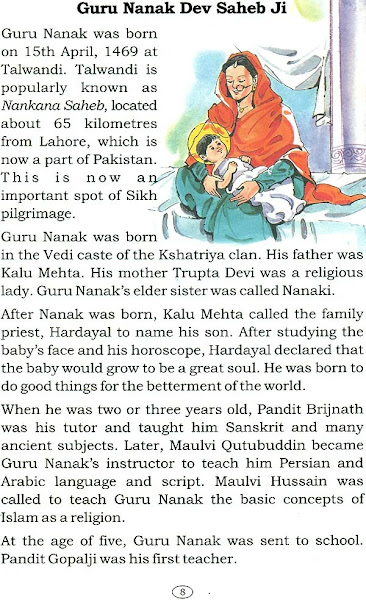Guru Granth Sahib not only teaches but tell way how to attain God.
When man abandons desire, then alone does he become a
true renouncer.
The Guru Granth Sahib is a lengthy religious text
comprising 1430 pages, compiled and composed by the Sikh Gurus from 1469 to
1708.
It consists of 19 lines of text
per page, with a total of 26,852 lines. The text was first assembled by the
fifth Sikh Guru, Guru Arjan Dev, from the
hymns of the first five Sikh Gurus. Inevitably as the last Guru, this holy book
is given the most important place in the Sikh religion.
The first
Guru of Sikhs was a great preacher of love and goodness. He travelled
a lot, spent a life full of wisdom and raised the flag of virtue,
equality, goodness and love. Not only this but he was also a great
poet and his thoughts, views and words have been catalogued as 974 poetic
hymns in the holy book 'Guru Granth Sahib.' On the auspicious
occasion, it would be perfect to recall some of his teachings and quotes
that are significant in our day to day lives even today!
The world is
burning in the fire of desire, in greed, arrogance and excessive ego. – Guru
Granth Sahib Ji
Humility is
the word, forgiveness is the virtue, and sweet speech is the magic mantra. –
Guru Granth Sahib Ji
Guru Granth Sahib contains
5894 hymns (shabad) written in 60 melodies (raag) by 35 authors, including 6 Sikh Gurus, 15 Bhagats, 3 Divines and 11 Poets, all from different social
classes, religions and spiritual traditions – making the Sikh scripture the
world’s most interfaith scripture. 974 hymns are written by the first Guru, 62
by the second Guru, 907 by the third Guru, 679 by the fourth Guru, 2218 by the
fifth Guru, and 115 by the ninth Guru. Among the remaining 922 hymns, the
highest number of hymns — totaling 541 — is by Bhagat Kabir. The melody (raag) of each hymn sets the mood
for the hymn, and is associated with a particular beat (taal), together which
provides the context or mood for the hymn.
The opening section of the Guru Granth Sahib is the Japji Sahib or
the Song of the Soul. The Japji Sahib begins
with the Mool Mantra or
root chant (Punjabi: ਮੂਲ ਮੰਤਰ), which
describes a human being’s true nature. The first sound is Ik Omkar (Gurmukhi: ੴ) which represents
the principle of oneness and continuous change in the Universe. The rest of
the Mool Mantra, Japji Sahib and
indeed the entire Guru Granth Sahib sets out to bring the reader and the
listener to this very experience of oneness.
More Guru Granth Sahib Facts:
·
The Guru Granth Sahib has a total of 1430 pages.
·
The pages are written with a landscape orientation.
·
There are 19 lines of text per page. However, many pages with headlines
(starting with new raag) have less than 19 lines per page.
·
Total number of lines are 26852.
·
Total number of words are 398,697.
·
Total dictionary words are 29445 (these are the words that have been used
again and again to make the whole text). Many of these words have been used
only once.
·
The word that has been repeated most often is ਹਰਿ. It has occurred 9288 times.
·
No punctuation marks like comma, semicolon or colon have been used. A
‘colon’ shaped character that has been used is not a colon.
·
No ‘Adhak’ character has been used.
·
No ‘Paireen Bindi’ character (dot at the bottom of character) has been
used.
Agya bhai Akal Ki tabhi chalayo Panth Sabh
Sikhan ko hukam hai Guru manyo Granth Guru Granth Ji manyo
pargat Guran Ki deh Jo Prabhu ko milbo Chahe Khoi shabad mein le Raj karega
Khalsa aqi rahei na koe Khwar hoe sabh milange bache Sharan jo hoe."
Translation:
"Under orders of the
Immortal Being, the Panth was created. All the Sikhs are enjoined to accept the
Granth as their Guru. Consider the Guru Granth as embodiment of the Gurus.
Those who want to meet God, can find Him in its hymns. The pure shall rule, and
impure will be no more, those separated will unite and all the devotees shall
be saved."
Practice Humility, Kindness, Compassion, Love & Humbling yourself allows you to see the goodness and presence of God in anyone.


No comments:
Post a Comment